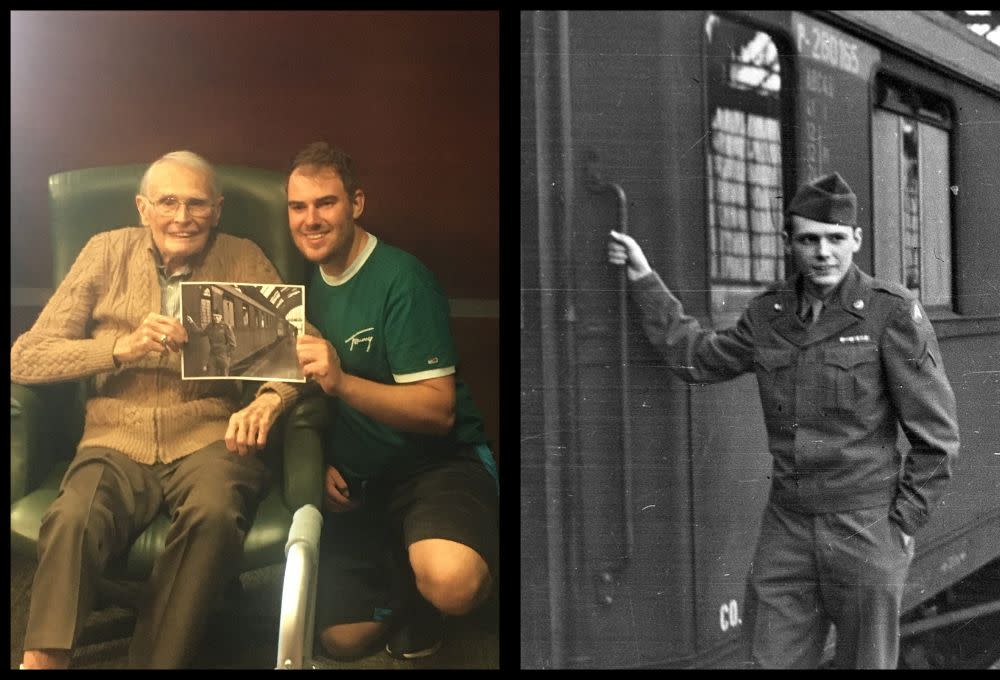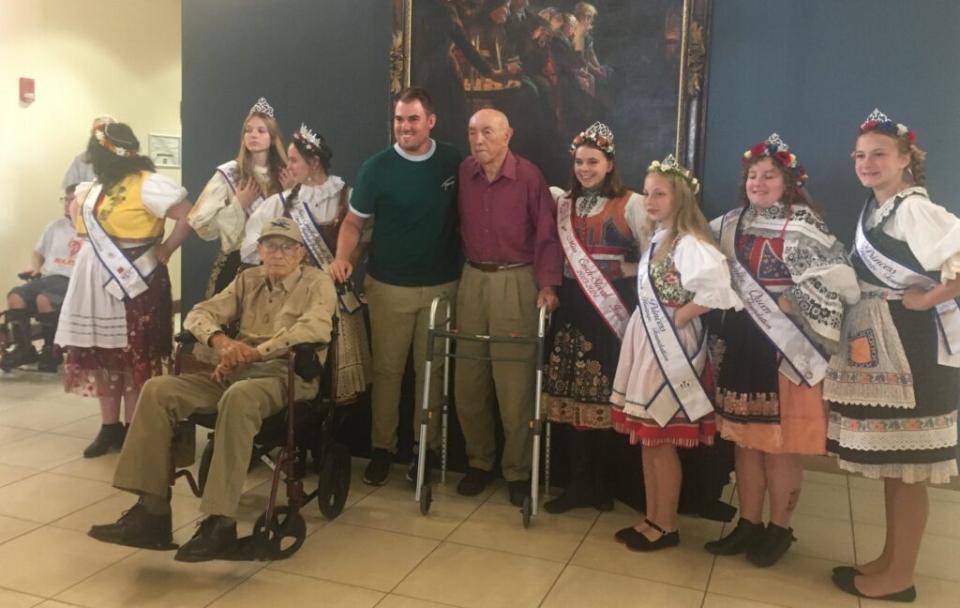Czech historian interviews Iowa WWII vets

At left, Waterloo architect and World War II veteran Hovey Brom, left, was interviewed by Czech Republic historian Jiri Kluc. (Photo by Patrick Kinney) At right, Hovey Brom is shown during World War II at a train station in the Czech capital of Prague at end of the war, bound for a furlough in Switzerland. (Photo courtesy of Hovey Brom)
WATERLOO — Hovey Brom has never returned to Pilsen since helping to liberate it in World War II. But he left a key to his heart in that city in the Czech Republic.
A young Czech historian brought that “key” back to Brom this week — and unlocked a flood of emotion for the retired Waterloo architect.
”There’s no way to adequately describe getting into Pilsen,” Brom, who’ll turn 99 Nov. 5, told Kluc. “That remains in my head. And I…” He paused, his voice breaking.
”It’s hard to talk about it, because it’s, such joy,” Brom said.
Kluc, a doctoral candidate at Charles University in Prague who has family in Pilsen, said. “Thank you for liberating my country.”
Kluc, 27 and a published author, spent a week interviewing several World War II veterans in eastern and central Iowa for a future work, and to preserve their stories for posterity.
He’ll take Brom’s story back home with him — and share it with the people of Pilsen next May when they celebrate the 80th anniversary of their liberation from Nazi Germany.
Brom was a forward observer in the 16th Armored Division of Gen. George S. Patton Jr.’s U.S. Third Army. A memorial to that division stands in Pilsen and the liberation anniversary is celebrated every year.
According to historic accounts, the citizens rose up agains their Nazi captors May 5, 1945. Patton’s troops arrived 8 a.m. the next morning. The Nazis surrended six hours later.
It is one of the most memorable moments of Brom’s life.
”It was a war, we were far away from home and everything was wrong,” Brom said.
His duties included scouting enemy positions ahead of Patton’s troops in a Jeep with a mounted machine gun. On two occasions, snipers shot out his windshield. He also crawled through fields, probling with a bayonet for land mines and marking them for avoidance and disposal.
“But when we left Germany and started going through Czechoslovakia, the tension just drained out,” Brom said. People welcomed him and his comrades as liberators, showering them with candy and hugs
.“A loving feeling,” he said. “We were in a country we enjoyed.”
Kluc interviewed Brom at the Sullivan Brothers Iowa Veterans Museum, part of Waterloo’s Grout Museum District. He also interviewed World War II veterans Evan “Curly” Hultman, 98. a retired Army Reserve major general who served in the Pacific. and David Greene, 99, who served in the 5th Marine Division at the Battle of Iwo Jima.
A few days earlier, Kluc honored two World War II veterans of Czech ancestry — Mike Bisek, 101, of Cedar Rapids and Bob Nejdl, 99, of Ely in a presentation at the National Czech & Slovak Museum & Library in the historic Czech Village area of Cedar Rapids.
“You are my heroes,” Kluc told the veterans before a standing-room-only audience at the museum, that included many of their family and friends. “They don’t say they are heroes. But they are.”
Bisek served in the U.S. Army Air Force as an aerial photographer, documenting the accuracy of bomb strikes, and also doubled as a gunner. He was with a B-24 Liberator bomber crew when they were shot down over the French Alps in July 1944 en route to a mission over Munich, Germany. They parachuted out of the plane and stayed with French resistance fighters until they linked up with liberating Free French and American forces near Grenoble before the Nazi surrender in May 1945.
Nejdl, who will turn 100 next Feb. 21, served with the U.S. Navy in the Pacific. He trained crews using the Curtiss SB2C Helldiver dive bomber, a carrier-based plane that became a mainstay of the U.S. carrier fleet by war’s end as the Americans engaged in an “island hopping” campaign to roll back the advance of the Japanese Empire.
Kluc‘s trip was made possible courtesy of the Czech Heritage Foundation of Iowa. He has published one work on Ervin Hoida, a Czech soldier who served in the British Army during World War II and passed away in February. An English language version of the book, “The Last of the Heroes: The Untold Story of Czechoslovak WWII Veteran Ervin Hoida,” will be available in June.
As part of the program at the Cedar Rapids museum, Kluc invited Bisek and Nejdl to celebrate the pending release of the English-language version of his work on Ervin Hoida by “baptizing” the book, each pouring part of a glass of beer over it, manufactured at Lion Bridge Brewing Co. nearby in Czech Village.
Kluc’s Iowa visit also included stops in Marion, at the Iowa Veterans Home in Marshalltown and other locations.
While the Nazis overran Czechoslovakia early on, in 1938-39, Kluc said the valor of World War II veterans, including Czech nationals and those of Czech ancestry, and his nation’s ultimate liberation hold important lessons for today.
“I’m trying to write a dissertation,” he said, but it’s also personal. “I’m interested in the stories of guys who liberated my country. Just to preserve the stories for future generations, for education,” in the Czech Republic and America.
”That’s touched my heart,” he said. “It’s important it’s preserved. When you meet these veterans, they share a lot of knowledge and a lot of memories. It helps your own identity, upgrading to a different level. That’s really special, and I’m really grateful for these moments. Because in my country, there’s almost no veterans left.”
Kluc and National Czech & Slovak Museum & Library president Cecilia Rokusek encouraged family and friends of World War II veterans to have those veterans come forward and tell their stories. The Grout Musuem District also has more than 2,300 oral histories of veterans as part of its “Voices of Iowa” project and is looking for more.
As part of the upcoming 80th anniversary liberation celebration in Pilsen, Kluc had Hovey Brom record greetings to the people there.
”Hello people from Pilsen! Hello! I love you!” Brom said.
Patrick Kinney’s blog, View from the Cedar Valley, is on Substack. This column is republished through the Iowa Writers’ Collaborative.
Editor’s note: Please consider subscribing to the collaborative and the authors’ blogs to support their work.
The post Czech historian interviews Iowa WWII vets appeared first on Iowa Capital Dispatch.



